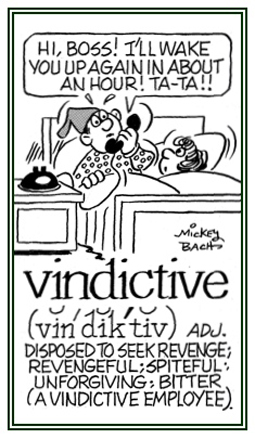dic-, dict-
(Latin: talk, speak, say, tell, declare; to proclaim)
2. A blood feud between families started by the killing of a member of one family that is then avenged by the killing of a member of the other family: The vendetta between two branches of the family had lasted so many years that no one actually remembered how it started or what it was all about.
3. Etymology: from Italian vendetta, "a feud, a blood feud"; from Latin vindicta, "revenge"; "vindictive"; from vim dicare, "to show authority"; from vim, accusative of vis, "force" + root of dicere, "to say".
English speakers borrowed vendetta from Italian, from which it ultimately traces to the Latin verb vindicare, "to lay claim to" or "to avenge". That Latin word is also in the family tree of many other English terms related to "getting even"; including avenge, revenge, vengeance, vindicate, and vindictive.
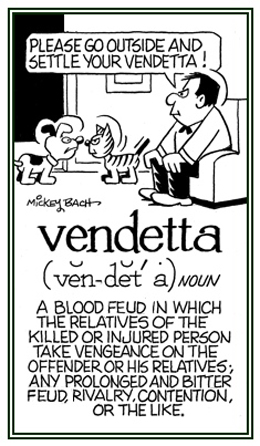
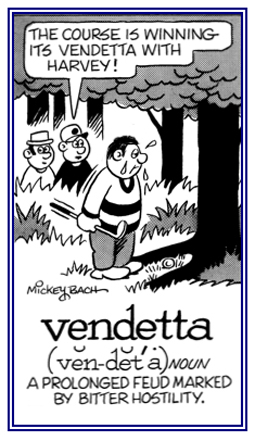
Go to this Word A Day Revisited Index
so you can see more of Mickey Bach's cartoons.
Henry attacked his sister's husband to get vengeance for her murder.
2. With great force or effort: The winter storm struck with a vengeance, destroying many trees and homes.Sharon set to work with a vengeance and finished her assignment in three hours instead of the usual eight hours.
3. Etymology: from Anglo-French vengeaunce, Old French vengeance, "revenge"; from vengier, "to take revenge"; from Latin vindicare, "to set free, to claim, to avenge".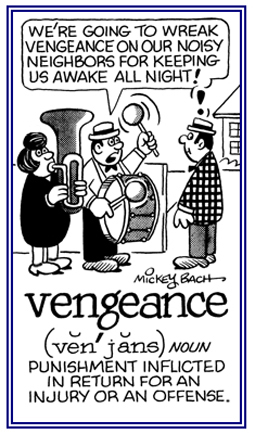
Go to this Word A Day Revisited Index
so you can see more of Mickey Bach's cartoons.
2. Etymology: formed on the analogy or similarity of revengeful from the out-dated verb venge; from Old French venger; from Latin vindicare, "to punish, to inflict pain or evil on a wrongdoer".
2. A decision or opinion pronounced or expressed about some matter or subject; a finding, a conclusion, or a judgement: The academic committee at the university reached a unanimous verdict about the admission of the new candidate for the doctoral program.
3. Etymology: from verdit,, the Anglo-Norman variant of Old French veirdit., "true statement, sworn testimony" which evolved from verdit, the Anglo-Norman variant of Old French veirdit., " a true saying" or "report".
This was a compound formed from veir "true" (a descendant of Latin verum, related to English very) and dit, "a saying, a speech"; which came from Latin dictionem, "a saying, an expression, a word".
2. Characterized by something that corresponds with facts or to reality, and therefore is genuine or real: Jimmy had a veridical hallucination that his parents were injured in an auto accident which turned out to be true.
3. Etymology: from Latin veridicus; from verus, "true" + dicere, "to say".
2. To show that someone or something is justified or correct: Marilyn checked with a dictionary resource to vindicate the unusual spelling of a word in her essay.
3. To clear from censure, criticism, suspicion, or doubt, by means of demonstration; to justify or uphold by evidence or argument: The new evidence that was presented in the criminal trial immediately vindicated the defense lawyer's position that her client was innocent.
4. To assert, to maintain, to make good, by means of action; especially, in one's own interest; to defend against encroachment or interference: The doctor's prognosis of the severity of the patient's illness was vindicated by a specialist.
5. Etymology: back formation from vim dictam accusative form of vis dicta, literally "announced force"; that is, "announcement of force".
From "to avenge" or "to revenge", from Latin vindicatus, the past participle form of vindicare, "to set free, to lay claim to, to assert, to avenge" which came from vim, accusative of vis, "force" + the root of dicere, "to say".
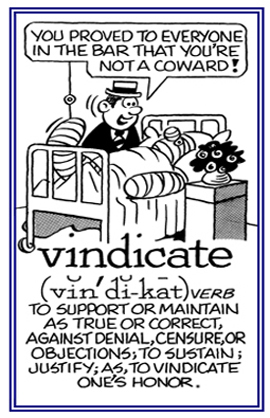
Go to this Word A Day Revisited Index
so you can see more of Mickey Bach's cartoons.
2. An action or circumstance which is proven to be reasonable or justified: Karl's decision to complete his computer programming at the university was a vindication that prepared him for his successful technical career.
2. Those who proclaim justification for certain actions or policies: The vindicators maintained that the violent back ground of the suspect justified the use of force by the police.
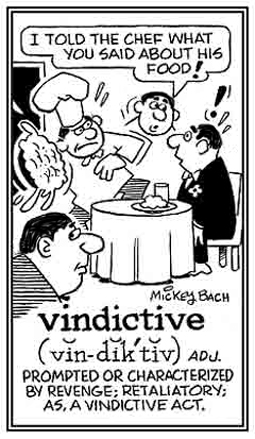
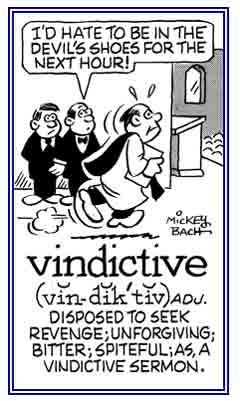
2. Relating to showing or doing something with a desire to hurt another person: The more angry Rose became, the more vindictive she was in terms of planning her revenge for the insults that her co-worker made about her incompetence.
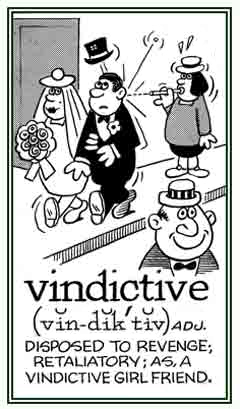
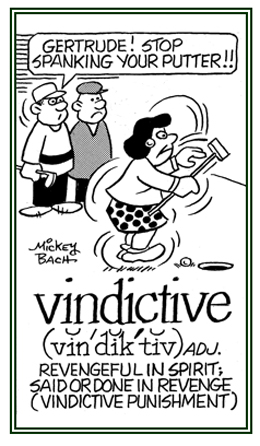
Go to this Word A Day Revisited Index
so you can see more of Mickey Bach's cartoons.
2. Etymology: from Latin vindicta, "avenge, vengeance (punishment inflicted)" + volent, "wishing".
Although the following cartoon is about an adjective vindictive, it also illustrates the meaning of the noun vindictivolence!
